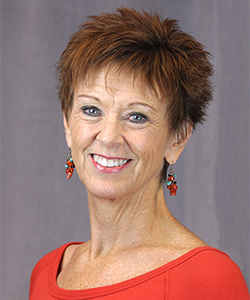
WisLAP program manager Linda Albert is the recipient of the Fourth Annual Excellence in Legal Community Leadership Award, presented by the Hazelden Betty Ford Foundation. The award recognizes outstanding work in service of struggling attorneys.
Oct. 21, 2015 – Linda Albert has many good reasons to get out of bed each morning: Helping lawyers find their way to recovery from mental illness or substance abuse.
Albert is the program manager for the State Bar’s Wisconsin Lawyer Assistance Program (WisLAP) – which provides confidential assistance to help lawyers, judges, law students, and their families cope with problems related to the stress of practicing law.
“It’s such a privilege to work with other human beings and watch them do the things they need to be able to do to return to a state of health and well-being,” Albert said.
Albert was recognized for the work that she does on behalf of lawyers and the legal community.
The Excellence in Legal Community Leadership Award
Albert is the recipient of the Fourth Annual Excellence in Legal Community Leadership Award, presented by the Hazelden Betty Ford Foundation. The award, established four years ago by Hazelden, recognizes outstanding work in service of struggling attorneys.
“It’s a great honor,” Albert said.
Albert, in her seventh year with the State Bar, has dedicated her career to helping others recover from substance use struggles and regain health and balance in their lives. A licensed clinical social worker and a certified alcohol and drug counselor, she has worked more than 32 years as an administrator, consultant, trainer, program developer, and psychotherapist in a variety of settings, including providing services to impaired professionals.
Albert is the recipient of the award not only for her demonstrated commitment to helping lawyers, but for her crucial role in a soon-to-be-published nationwide study involving the health of legal professionals, according to Patrick Krill, director of Hazelden’s Legal Professionals Program.
Krill, lead author of the study, teamed up with Albert after working together in the past. He said Albert’s experience and dedication to the project over the past 18 months, as well as her tireless effort, were critical to its success.
“It was a large undertaking that required a significant amount of work,” Krill said. “We wouldn’t have gotten where we are without her input and her effort.”
A collaboration between the American Bar Association and Hazelden, the study measures levels of depression, anxiety, and levels of substance use, such as hazardous levels of drinking alcohol, among lawyers across the country.
Hazelden, a nonprofit organization, helps people reclaim their lives from the disease of addiction, and runs a residential addiction treatment program specifically for legal professionals.
A Landmark Study
This landmark study will impact lawyer assistance programs for years to come. It encompasses data from 12,825 surveys by individual lawyers from 17 bar associations across the country. Getting the bar associations on board took Albert six months of work.
“The research shows the legal profession has a higher rate of substance use problems, and a higher rate of depression and mental health concerns than the general population,” Albert said.
It is the first study of lawyer wellness to include data from across the nation, rather than in one area or state. The last significant study – a regional one – was in the late 1980s. “We really need current data to understand what our lawyer assistant programs are facing,” Albert said.
I think the greatest thing we can do for other human beings is to just give them hope.
She hopes to share the data with others, such as the Office of Lawyer Regulation, the Board of Bar Examiners, law schools, and the courts. The entire system needs to look into promoting health and wellness and early identification of potential problems, she said.
“If we don’t look at this systemically, we’re missing the boat,” Albert said. “That’s how we’re going to be able to get at this – if we all work together.”
Publication of the study will be in an upcoming issue of the Journal of Addiction Medicine. “It’s a very prestigious journal in the field of addiction medicine and mental health,” Albert said. And look for results of the study in a future issue of the Wisconsin Lawyer™ magazine.
Information gathered in the study will be used to enhance the State Bar’s WisLAP volunteer training and preventative programs as well as the outreach presentations, explained Albert. It is important to learn as much as possible from the study in order to answer the question, “What else do we need to do to help our members?”
Giving Hope
Albert is an advocate for ongoing research related to lawyer wellness. She serves on the ABA Commission on Lawyer Assistance Programs, heading up the Research section. In the past, she co-facilitated a research project on compassion fatigue and legal professionals.
She is driven by the opportunity to make a positive contribution to the lives of the individuals and the fields of practice she serves.
“There really hasn’t been a lot of focus on health and wellness among legal professionals,” Albert said.
For the State Bar, she manages the WisLAP program, which focuses on health and wellness for legal professionals – to help attorneys to thrive as they work in a high-pressure career. The program has grown in the past years, and now has about 200 trained volunteers – attorneys and judges – who anonymously and confidentially help other legal professionals. “Many of them may have experienced a problem themselves,” Albert said.
She is out to change all that – by encouraging those who need it to reach out for help.
“I think the greatest thing we can do for other human beings is to just give them hope,” she said.
